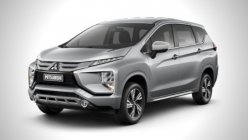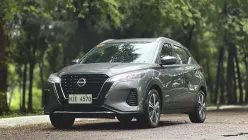Electrified mobility is the wave that practically all of the world’s carmakers are riding. While this opens up opportunities for innovation across all price points, there may be caveats as to the long-term reliability of electric vehicles (EVs).
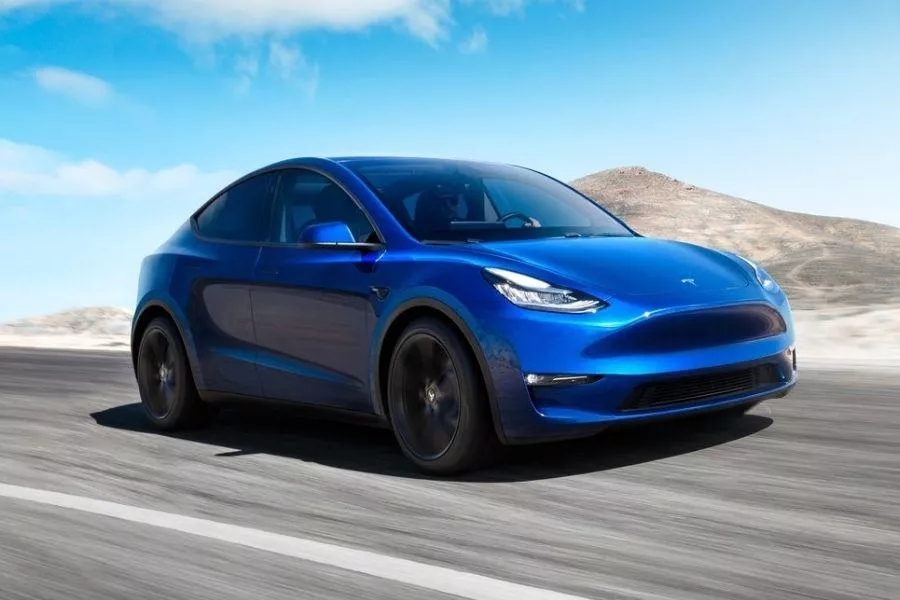
Electric SUVs such as the Tesla Model Y fail in terms of reliability, according to Consumer Reports
According to reliability rankings by Consumer Reports, EVs leave much to be desired in the reliability scale. This holds true particularly for electric sport utility vehicles (SUVs), which received an overall rating of ‘below average.’ Analysts say the problem lies with extra tech features that automakers pack into these vehicles, especially on luxury models.
Owners of electric SUVs often report problems with in-car electronics and power features on their vehicles. Interestingly, those are shaping up to be more troublesome than the powertrain components of the EVs themselves.
It might have something to do with an EV’s power source, but automakers seem to pack more infotainment features on battery-powered vehicles than they do on regular combustion-powered models. This tends to add complexity to the onboard systems on electric SUVs, making them more vulnerable to problems.
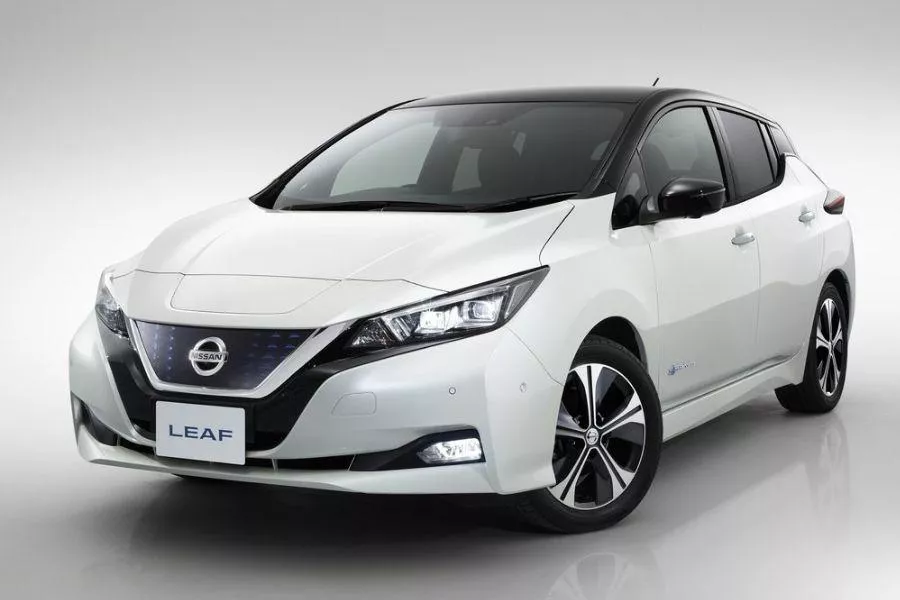
Smaller EVs with less complex tech tend to have fewer problems
Consumer Reports organized the rankings by brand, with luxury EV brand Tesla nearing the bottom of the barrel next to Lincoln. The group assessed the Tesla Model Y as having ‘much worse than average’ reliability in 2020, although Model 3 units made in China tended to have higher scores.
But critics should think twice before pouncing on this news as an excuse to discourage others from buying EVs in general. Consumer Reports adds that based on its rankings, EVs with less complex features such as the Nissan LEAF actually did better than their bigger counterparts.
At the other end of the spectrum, compact hybrids and plug-in hybrids reached the top of the rankings with above-average overall reliability. According to Consumer Reports’ findings, both are less expensive to maintain and repair than gasoline vehicles. The costs drop even lower compared to EVs once they’ve reached 160,900 kilometers.
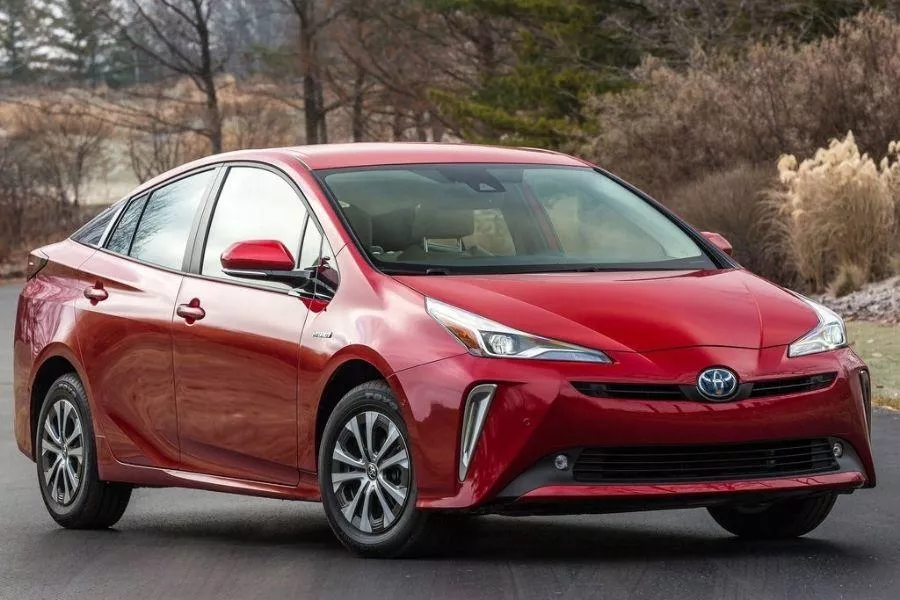
According to customers surveyed, hybrids top the list with above-average reliability
In the Philippine market, EVs have yet to gain widespread acceptance, mainly due to prohibitive pricing and range anxiety due to a lack of the necessary charging infrastructure. Only Toyota so far offers hybrid models in its lineup such as the Prius, Corolla Cross, and Altis compact sedan. Meanwhile, Geely markets its 48-volt mild-hybrid powertrains on the Azkarra compact and Okavango midsize crossovers. Among the major automakers, only Nissan Philippines offers an EV in the form of the LEAF.
We demonstrate our reliability where industry news is concerned at Philkotse.com.
Know more about Nissan LEAF 2026

The Nissan LEAF 2025 Philippines is a 5-door hatchback fitted with an all-electric powertrain. It is offered in the Philippines with one variant only which is priced at Php 1,998,000. Powering this electric vehicle (EV) is a synchronous electric motor capable of generating 148 horsepower and 320 Nm of torque. A 40-kWh lithium-ion battery is used, which aids the model's 311 km range. Only a single-speed gear reduction system is utilized to exclusively send power to the front wheels.
Dimensions-wise, the LEAF has a length of 4,490 mm, a width of 1,788 mm, and a height of 1,540, with ground clearance and wheelbase rated at 155 mm and 2,700 mm, respectively. This is the first and only commercially available EV in the country. But in the all-electric options, the alternatives of Filipino car buyers include the Porsche Taycan, Hyundai Ioniq EV, and BYD E6.
>>> New and used Nissan LEAF 2025 for sale in the Philippines
Nissan LEAF Launch
The first-generation Nissan LEAF was initially introduced in the United States and Japan in December 2010. Due to its striking road presence and overall impressive performance, it gained recognitions such as the Green Car Vision Awards in 2010, the European Car of the Year and the World Car of the Year both in 2011 and the Car of the Year Japan for two consecutive years. Also, this multi-awarded electric vehicle is acclaimed as the world’s top-selling as of December 2019.
The second-generation Nissan LEAF was unveiled in October 2017. It was made available in the US and Europe a year later. The Nissan LEAF made its Philippines debut in May 2021. Nissan Philippines is offering the LEAF at Php 2,798,000. Available colors for the 2025 Nissan LEAF with the two-tone blacked-out roof include Pearl White, Vivid Blue, Gun Metallic, and Magnetic Red.
Nissan LEAF Exterior
The new Nissan LEAF comes with a sporty exterior design, and it looks similar to the global model that’s currently being sold in Japan, the United States, and Europe. In terms of dimensions, the LEAF electric vehicle measures 4,480mm long, 1,790mm wide, and 1,540mm tall. It also has a wheelbase of 1,540mm and a ground clearance of 155mm.
The Nissan LEAF is fitted with halogen headlamps with LED daytime running lights. It also has front fog lamps and a rear fog lamp, rain-sensing wipers, electronically adjustable and foldable front mirrors, and a rear wiper. The said electric vehicle also comes with Nissan’s signature V-motion grille. The LEAF is finished off with a set of 16-inch alloy wheels, wrapped with 205/55R16 tires.
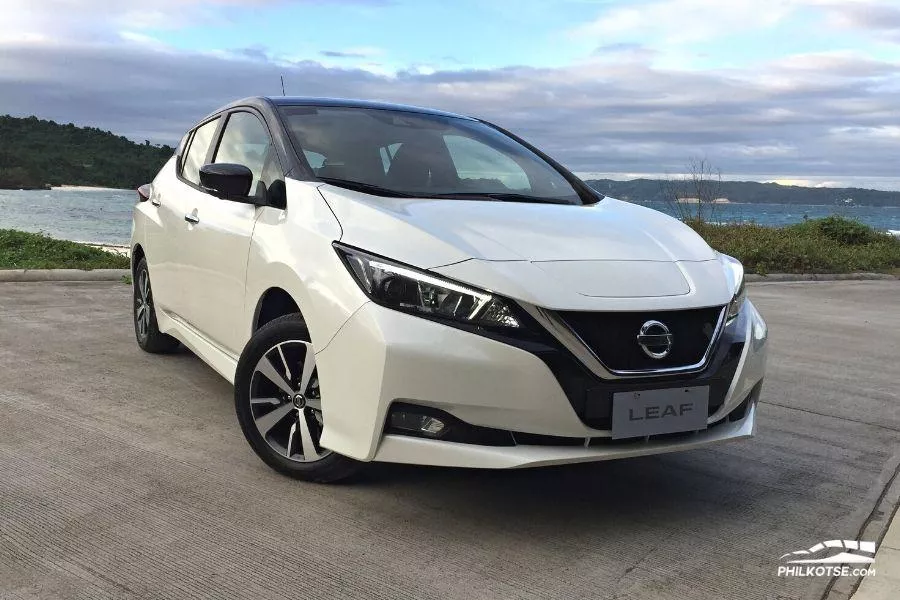
Nissan LEAF Interior
The Nissan LEAF 2025 can accommodate up to five occupants. It has a dark interior theme along with an automatic climate control system, and fabric-clad seats. The LEAF also comes with a six-way manually adjustable driver’s seat, a leather-wrapped steering wheel with tilt adjustment, a push-to-start button, and a multi-information meter.
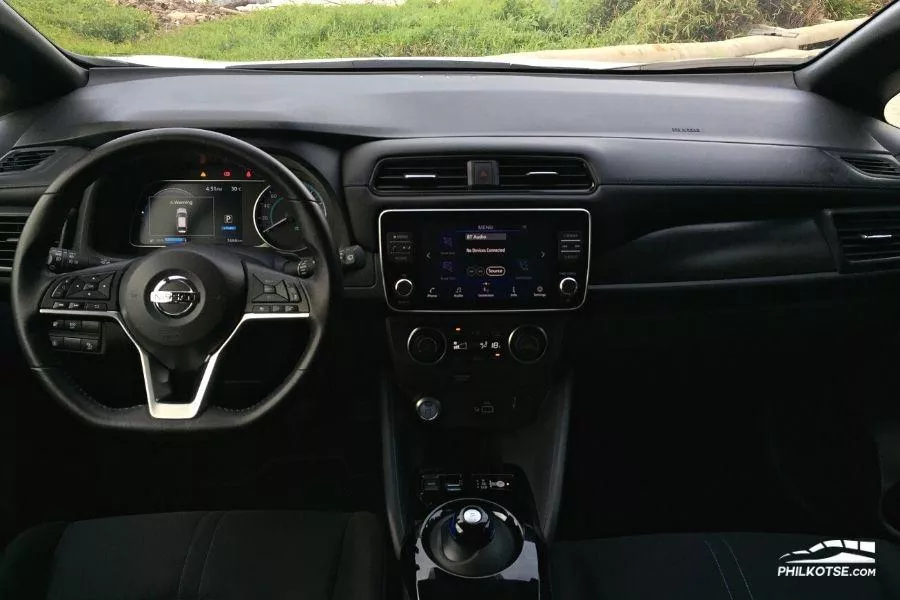
Technology & Safety Features
The LEAF Philippines is integrated with several techs and safety features. Placed at the center of the dashboard is an eight-inch touchscreen with Apple CarPlay and Android Auto. It also comes standard with a 360-degree view camera that can detect moving objects. The LEAF also has a driver attention alert system that warns one of the things moving in the car’s blind spots, rear end, and whenever you’re departing a lane. Adding to the list of the LEAF’s features are the following: hill-start assist, vehicle dynamic control, and anti-lock braking with electronic brake-force distribution. On the more passive side, the Nissan-made EV comes with a total of six airbags.
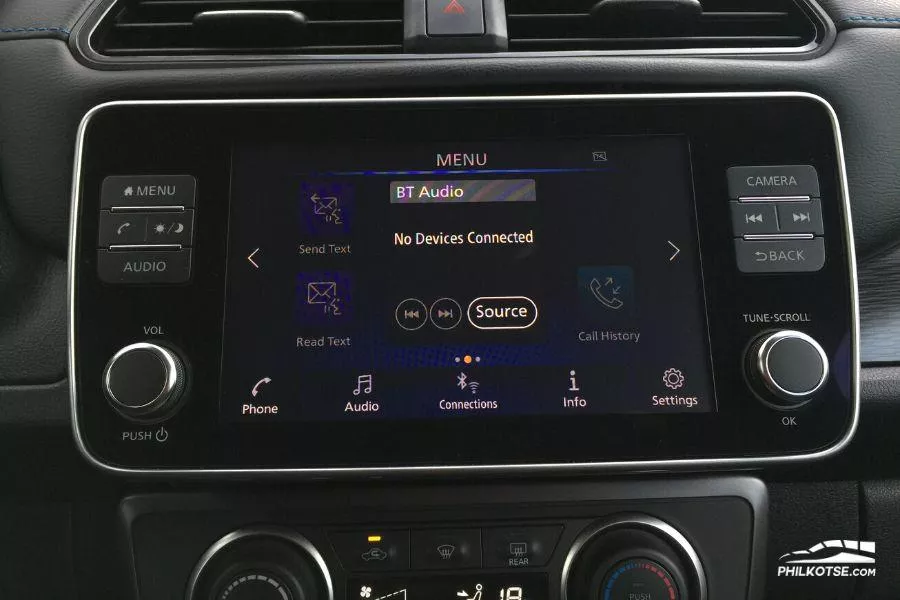
Platform & Chassis
The new Nissan LEAF is fitted with an independent front strut suspension and torsion beam suspension at the rear.
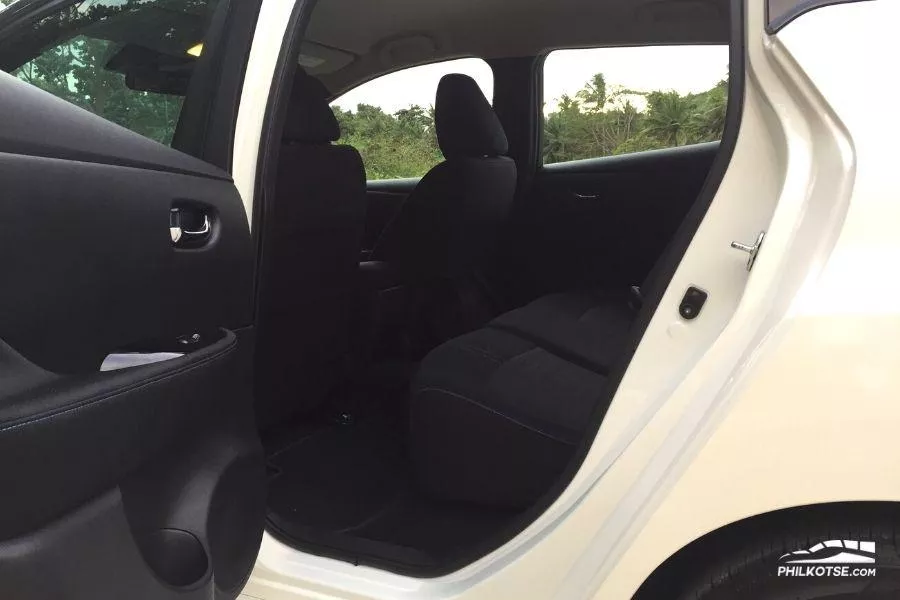
Engine & Drivetrain
The Nissan LEAF EV is powered by an electric motor that delivers 148 hp and 320 Nm of torque. Power is sent to the front wheels via a single-speed gear reduction system. The Nissan-made EV uses a 40-kWh lithium-ion pack with a 311-kilometer range. This can be charged with your bog-standard wall outlet, and doing so will fill it up fully in 15 to 18 hours. However, a quick charging station cuts down the LEAF’s charging time down to just 40 minutes to an hour.
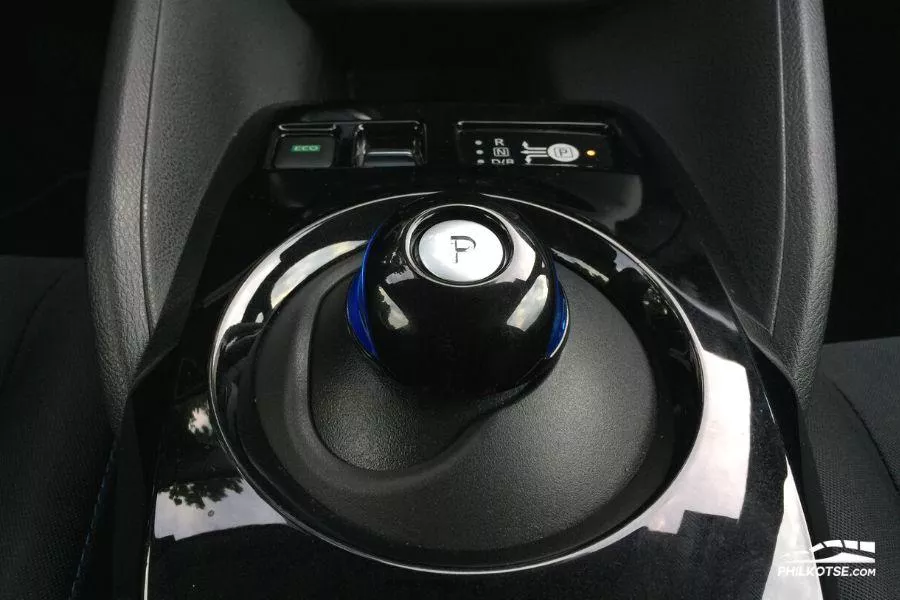
Available colors for the Nissan LEAF are Gun Metallic, Vivid Blue, Magnetic Red, and Pearl White, all of which come with a Pearl Black roof.
The Nissan LEAF still doesn't have a lot of competition in the country as the local EV market is still relatively new.
Nissan LEAF 2025 Price List
| Variant | Price |
|---|---|
| Nissan LEAF 40kWh | ₱1,998,000 |
Nissan LEAF Pros & Cons
Pros
-
Offers 311 km of range
-
Sleek styling with the two-tone finish
-
Cheaper to run combustion engines
Cons
-
Relatively expensive price tag
-
EV infrastructure is still in its early stages.
-
First-time EV owners might expect more in terms of driving experience
Nissan LEAF FAQs
1. How much does a Nissan LEAF 2025 cost in the Philippines?
In the Philippines, it is available in one variant which is priced at P1,998,000.
2. What problems does the Nissan LEAF have?
Nissan LEAF had some issues about reliability, with some electrical and brake concerns.
3. What is the body type of Nissan LEAF?
The body type of LEAF is a hatchback.
4. Does the Nissan LEAF 2025 have a reverse camera?
Yes, it does. With the reverse camera, you can see what is behind the car on the screen.
5. What is the Length of Nissan LEAF Philippines?
The length of LEAF is 4,490 mm.
₱ 1,998,000
ExploreRecent posts
- lexus mazda toyota lead reliability Nov 19, 2021
- best car brands united states Feb 23, 2021
- Consumer Reports to rise Tesla’s ratings over Auto Braking Oct 13, 2020


